An Architect of Counter-Insurgency Warfare: Brigadier Ponwar’s 18 Years of Training India’s Elite Forces
Rama Devi Menon
|
17-October-2024
Vol 15 | Issue 42
“Mission Janbaz Commando Banana,” meaning a mission to create brave commandos, is etched on a rock at the elite Counter Terrorism and Jungle Warfare College (CTJWC) in Kanker, Chhattisgarh, a region once heavily impacted by Naxalite extremism.
In 2005, CTJWC was established on barren hills, spread over an 800-acre campus. With 18 firing ranges designed to simulate every possible battlefield scenario a soldier might face, endurance tracks, a Combat Conditioning Ground, and open-air classrooms, policemen are trained here to “Fight the Guerrilla like a Guerrilla.”
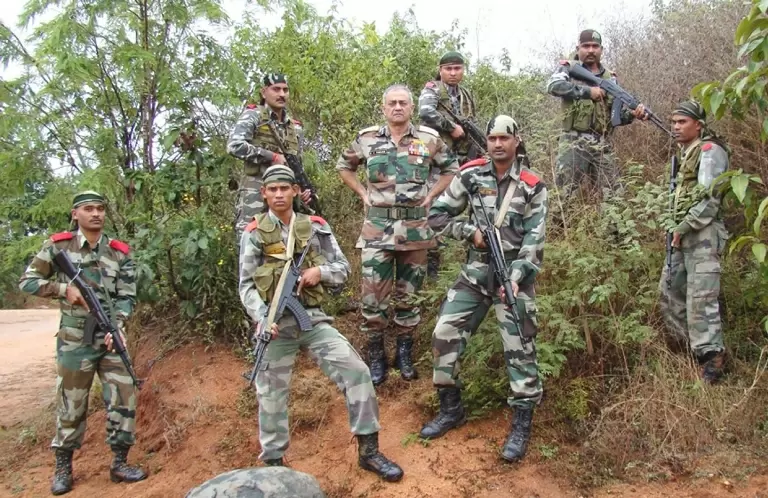
| Brig. Basant Kumar Ponwar trained around 37,000 commandos during his stint at CTJWC (Photos: Special Arrangement) |
Brig. Basant Kumar Ponwar, a highly-decorated Army officer, who was roped in to head the unit since its inception in 2005, has left an indelible mark on the history of counter-insurgency warfare in India.
As Commandant of the Indian army’s Counter Insurgency and Jungle Warfare (CIJW) School in Vairangte, Mizoram, Brig. Ponwar had been training small batches of policemen from Chhattisgarh.
Later, responding to a “friendly request” from the then governor of Chhattisgarh, Lieutenant General Krishna Mohan Seth, himself a veteran of anti-insurgency operations in Nagaland, Brig. Ponwar headed to Chhattisgarh on the very day he retired from the Indian Army.
In his second innings in the uniformed services, he served as an Inspector General of Police at CTJWC in Chhattisgarh for 18 years, until 2022, and trained 37,000 commandos, numerous IPS officers, and even mongrels for sniffer duties.
He also provided guerrilla warfare training to personnel from the Indo-Tibetan Border Police, Sashastra Seema Bal, Border Security Force, and Central Reserve Police Force, all deployed in Naxalite-affected areas.
Shortly after the first Young Commando (YC-1) test course was completed in 2005, the trainees encountered Naxalites deep in the jungle and successfully eliminated them.
As the news of the encounter spread, many Naxal-affected States sent their police personnel to the college to train, and replicated the training in their states.
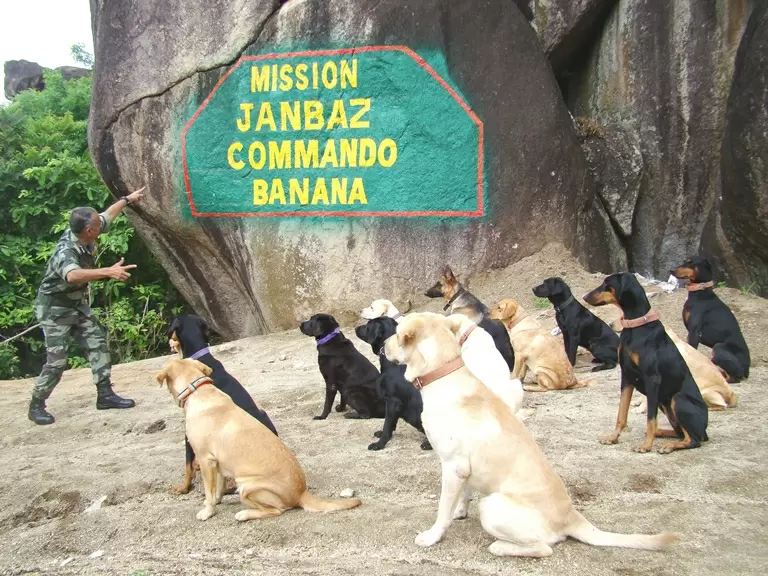
| Brig. Ponwar raised a mongrel dog squad for sniffer duties |
In Chhattisgarh alone, 25 to 30 IPS officers have been trained at CTJWC, among whom 16 have received Presidential bravery awards. The present IG of Bastar has also trained at CTJWC as have many Superintendents of Police, who are doing commendable work to eradicate the Naxalite movement.
“The Counter Naxal operations are coordinated and managed by the officers, and CTJW only provides them combat training,” says Brig. Ponwar.
He emphasises that all police recruits should undergo combat training and points out that many women have outperformed men.
“I have observed that women are physically, psychologically, and emotionally capable of leading and executing combat operations, often better than men. If Maoist cadres can have women in the forefront, why can’t our women fight the guerrillas?” quips Brig. Ponwar.
During the 45-day training, the trainees undergo rigorous physical conditioning. If they fail to clear the course within 45 days, they must retake it until they pass.
Brig. Ponwar emphasises that to become a "yodha," or warrior, what’s needed is "physical toughness," not just "physical fitness," along with emotional control. “We make men out of boys!” he says. No training is halted due to bad weather.
The gruelling "jungle warfare module" is specifically designed to prepare commandos for deployment. The training standards are the same for both men and women. As Brig. Ponwar points out, “When I teach you to fire an AK-47 rifle, the bullet travels at the same speed whether it is fired by a man or a woman.”
The college has even been recognised by international media as a model for running counter-insurgency schools.
An avid dog lover, Brig. Ponwar has also been instrumental in training mongrels for sniffer duties. He firmly believes that mongrels are in no way inferior to their pedigreed counterparts.
“These so-called country dogs rarely need veterinary care, can work for long hours, and walk 30-40 km without showing signs of fatigue or exhaustion,” he says. They have adapted exceptionally well to the jungle terrain, be it hot and humid, cold, or rainy.
When the CTJWC received information that Naxalites had destroyed a power line tower and laid some improvised explosive devices (IEDs) along the Barsur-Dantewada road in southern Bastar in June 2008, the CTJWC’s bomb disposal team arrived at the scene.
The canine ‘Teja’, who was deployed to locate IEDs, quickly traced the device. ‘Teja’ also detected a booby trap laid by the Naxals.
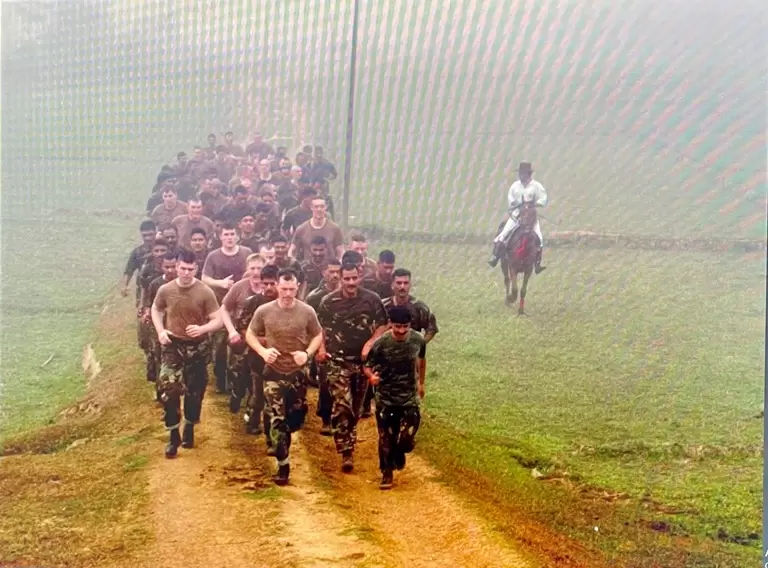
| Policemen go through tough training at CTJWC to 'fight the guerrilla like a guerrilla' |
Similarly, when a country-made bomb exploded on the premises of the Bilaspur High Court building in October 2008, ‘Lily’ was deployed to begin combing operations. Lily was subsequently stationed at the court for continued vigilance.
Teja, Kareena, Sally, and Lily would likely have been rummaging through garbage bins in the city bylanes if Brig. Ponwar had not rescued them from the streets and trained them in sniffer duties.
In July 2007, the CTJWC began training these mongrels, which successfully passed the grading tests conducted by a board of officers and graduated along with two Labradors in April 2008.
These mongrels have also undertaken operational tasks such as clearing roads, road inauguration parties and VIP duties, and also performed in total harmony with their Labrador and Alsatian counterparts at the Republic Day and the Independence Day Parades. They have been accompanying long range patrols in jungle terrain over 2-3 days without complaining.
Brig. Ponwar has also been training Marwari horses from Udaipur and Jaipur in Rajasthan. Commandos use these horses to navigate the rough terrain, particularly in the outskirts of Kanker.
These horses have participated in Republic Day and Independence Day parades and have won several medals in 60 km and 80 km endurance races in Jodhpur. A Polo enthusiast, Brig. Ponwar has ridden the renowned Zanskari ponies on the high slopes of Leh.
During his days in the army, Brig. Ponwar carried out counter-insurgency operations in Nagaland, Punjab, Tripura, and later in Bastar. He has been involved in various special missions, including those across international borders.
During the 1971 Bangladesh war, he was among the first troops to reach Dacca (now Dhaka) through a para drop at Tangail, which remains one of India’s most successful parachute operations.
Born on March 3, 1949, in Indore, Brig. Ponwar was commissioned into the 1st Maratha Light Infantry in December 1969 as a Lieutenant, where he mastered anti-terrorist operations in Jammu and Kashmir, Nagaland, and Tripura.
The 1st Maratha Light Infantry was part of the 95 Mountain Brigade, and by 1971, Brig. Ponwar was serving in Nagaland, in the midst of counter-terrorist operations.
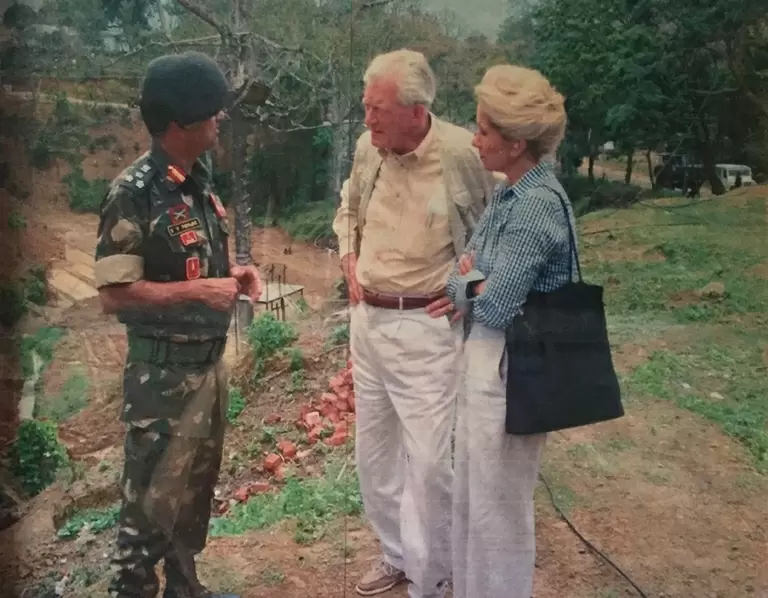
| Brig. Ponwar with the then US Ambassador David Campbell Mulford |
Soon after, the entire 95 Mountain Brigade was placed under the 101 Communication Zone and tasked with moving to the Eastern theatre of the war to help liberate Bangladesh.
The 1st Maratha Light Infantry accordingly moved to Joshepur, south of Tura in Meghalaya, and by late November 1971, they were involved in small cross-border skirmishes with the Pakistani army inside Bangladesh.
Initially, Brig. Ponwar, then a Lieutenant, led an ambush party consisting of soldiers from the Battalion, which specialised in counter-insurgency operations, along with local Mukti Bahini fighters.
They crossed the international border into Bangladesh, where the team ambushed a Pakistani mail vehicle on the Jadavpur-Mymensingh road and began gathering intelligence on enemy positions in the area.
Lieutenant Ponwar also participated in the second raid conducted by two Battalions on the Kamalpur border outpost.
While the 13 Guards launched an attack on the Kamalpur outpost, held by Captain Ahsan Malik of the Pakistani army, the 1st Maratha Light Infantry successfully cut off the heavy mortar support brought in for the outpost’s defence.
Though the Kamalpur outpost held their ground, the 1st Maratha Light Infantry managed to destroy the enemy mortars.
As the war with Pakistan officially broke out on December 3, 1971, the entire 95 Mountain Brigade sprang into action in Bangladesh.
The 1st Maratha Light Infantry was the first to capture the town of Bakshiganj, though it lost one of its sepoys in the process. Lieutenant Ponwar fought alongside his Battalion and later moved into the thick of the battle to capture the town of Jamalpur.
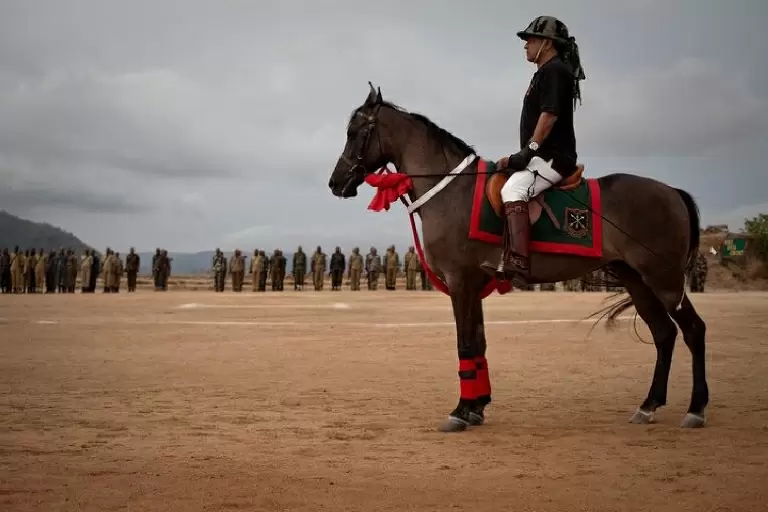
| Brig. Ponwar has also trained Marwari horses from Udaipur and Jaipur |
Jamalpur was the stronghold of the 31 Baluch regiment of the Pakistani army. After Brigadier Hardev Singh Kler’s request for the 31 Baluch to surrender was rejected by Lieutenant Colonel Sultan Ahmed, the 1st Maratha Light Infantry outflanked the enemy by crossing the Brahmaputra river in fishing boats. They closed in on the 31 Baluch’s garrison, coming within just 1,000 yards of the enemy.
The 1st Maratha Light Infantry eventually decimated the 31 Baluch with a heavy ambush assault, overwhelming the Pakistani soldiers.
After liberating Jamalpur, Lieutenant Ponwar was on the lead vehicle as the link-up officer at the Poongli Bridge with the 2 Parachute Battalion outside Tangail.
The Battalion crossed the Turag River on foot, advancing towards Dacca. Lieutenant Ponwar was present in Dacca during the city's liberation and was later assigned to guard and manage Pakistani prisoners of war after the surrender ceremony. He was just 22 at the time.
Later, he served as an instructor at the Commando Wing of the Infantry School in Belgaum, Karnataka, from 1978-1981, specialising in counter-insurgency and jungle warfare training.
In addition to his time in Belgaum and at the CIJW in Vairangte, he held instructional posts in several training institutes, including in Chennai (formerly Madras) and at the Army War College in Mhow, focusing on counter-insurgency and counter-terrorism training operations.
While serving as the Commandant of the CIJW School in Mizoram, Brig. Ponwar conducted the first Indo-US Defence cooperation exercise “Yudh Abhyas I” in 2004, attended by the US Ambassador to India, David Campbell Mulford.
Thoroughly impressed by the exercise, Mulford remarked, “I thought this was just a social interaction with the Indian Army, but we have learnt the nuances of warfare, which will help us enormously in our operations in Iraq and Afghanistan.”
This exercise has since continued annually, alternating between the US and India.
Brig. Ponwar also coordinated counter-insurgency and counter-terrorism training for all the Corps Battle Schools across the country, and travelled extensively to disturbed states. He has delivered numerous lectures at Army and Navy War Colleges on counter-insurgency and counter-terrorism operations, particularly on “Naxalism.”
Brig. Ponwar has also been invited to speak on counter-insurgency and counter-terrorism in London, Germany, Australia, and at the Indian Army War College.
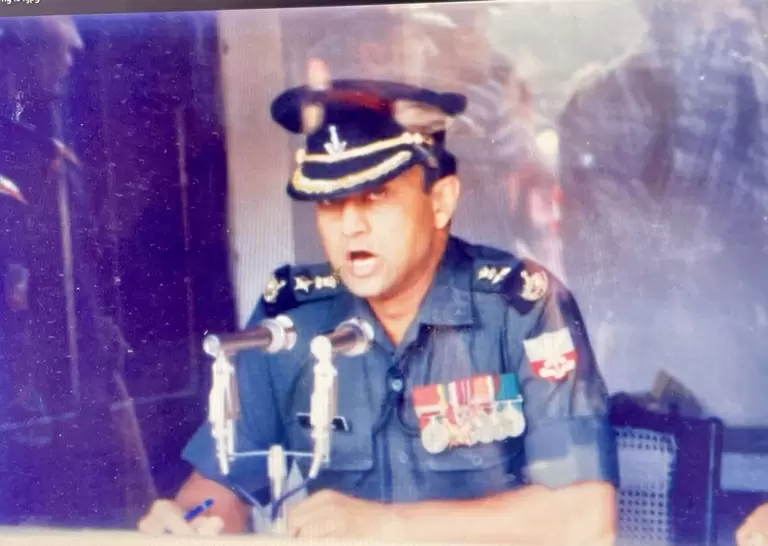
| Brig. Ponwar in his younger days, dressed in army uniform |
He has also served as a mentor at the Strategic Gaming Exercise at the National Defence College, New Delhi, on left-wing terrorism. In addition, Brig. Ponwar has been lecturing young entrepreneurs’ organisations in Kolkata, Bangalore, Hyderabad, and Delhi.
A fitness enthusiast, his hobbies include jungle lore, high-altitude trekking, river rafting, horse riding, remote area development, and photography. He is also a keen conservationist, introducing arboriculture—the care of trees, shrubs, vines, and other woody plants—wherever he has been posted.
During his time in Ladakh, he played a key role in the preservation of the “Black Necked Crane” and helped restore the historical Zorawar Fort at Leh, in collaboration with the Indian Trust of Art and Cultural Heritage.
Coming from a military background, Brig. Ponwar studied as a boarder at Bishop’s School in Pune. His father, an Army veteran, served in the Middle East during World War II.
Brig. Ponwar’s legacy continues, with both his sons now commissioned in the Indian Army. Fondly called “Pony” by his friends, he is now enjoying a well-deserved retirement in Mhow after an illustrious 54-year career in service of the nation. - ©TWL
















